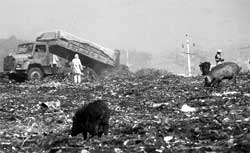Disposal
 "We simply dispose waste in abandoned quarries and other areas,' said Dhaigude, when asked about the waste disposal system in Mumbai. In the parlance of the municipal officials, disposal of waste means dumping.
"We simply dispose waste in abandoned quarries and other areas,' said Dhaigude, when asked about the waste disposal system in Mumbai. In the parlance of the municipal officials, disposal of waste means dumping.
Besides open dumping, the most commonly-practised methods for disposing of waste are sanitary landfilling (slf) and composting. slf is a scientific method by which refuse is reduced to the smallest practical volume and covered with a layer of earth at the end of a day's operation or at frequent intervals as may be necessary. However, in India, sanitary landfilling refers to the crude dumping of wastes. There is no science involved in making or maintaining landfills.
In most cities, the waste deposited at landfills is generally neither spread out nor compacted on a regular basis. During the rains, toxins present in the garbage dissolve and mingle with the groundwater. Ravi Agarwal of Srishti, a non-governmental organisation, says: "It must be remembered that all landfills, no matter how well they are constructed, leak over time and there is a high risk of contaminating the groundwater.'
According to A K Lal, planning engineer, Town and Country Planning Organisation, New Delhi, "Properly designed and maintained sanitary landfills with layers of impermeable linings at the bottom and piping to relieve the gas pressures, as also to drain off leachate, are almost non-existent in India.'
The second method, composting, can be done both by aerobic and anaerobic processes. The former is a biological oxidation process where the organic portion of the waste is decomposed and used as a manure. This process can be completed in 45-50 days. The anaerobic method takes about 180 days for garbage to break down into compost.
The problem arises when the composting process is not followed properly. "Unsegregated waste is just dumped in a pit and allowed to decay. The entire operation is unhygenic, unscientific, foul-smelling and very slow,' notes the Interim Report.
At present, Mumbai, Bhopal and Delhi have one composting plant each. A report prepared by cpcb in March 1998 pointed out, "The Okhla compost plant in Delhi, though operating, cannot be considered good. The existing machinery needs overhauling and effective maintenance. The compost quality needs to be analysed for health safety before selling it to private users.' The other two plants are also reported to be in no better order.
Related Content
- Order of the National Green Tribunal regarding dumping of fly ash in river Muri Ganga, South 24 Parganas district, West Bengal, 29/04/2025
- Order of the National Green Tribunal regarding depleting habitat of brown bears in Sonmarg and Baltal region of Jammu & Kashmir, 22/04/2025
- Affidavit filed by the Kumaon Commissioner, Nainital regarding pollution of Naini lake, Uttarakhand, 16/04/2025
- Response by applicant, Raja Muzaffar Bhat to report of Jammu & Kashmir Pollution Control Committee on the illegal disposal of waste on the banks of river Poonch, 16/04/2025
- Order of the National Green Tribunal regarding desilting of the Defence Colony drain in Delhi before the monsoon, 16/04/2025
- Report filed by the Central Pollution Control Board on waste to energy plants, 15/04/2025
